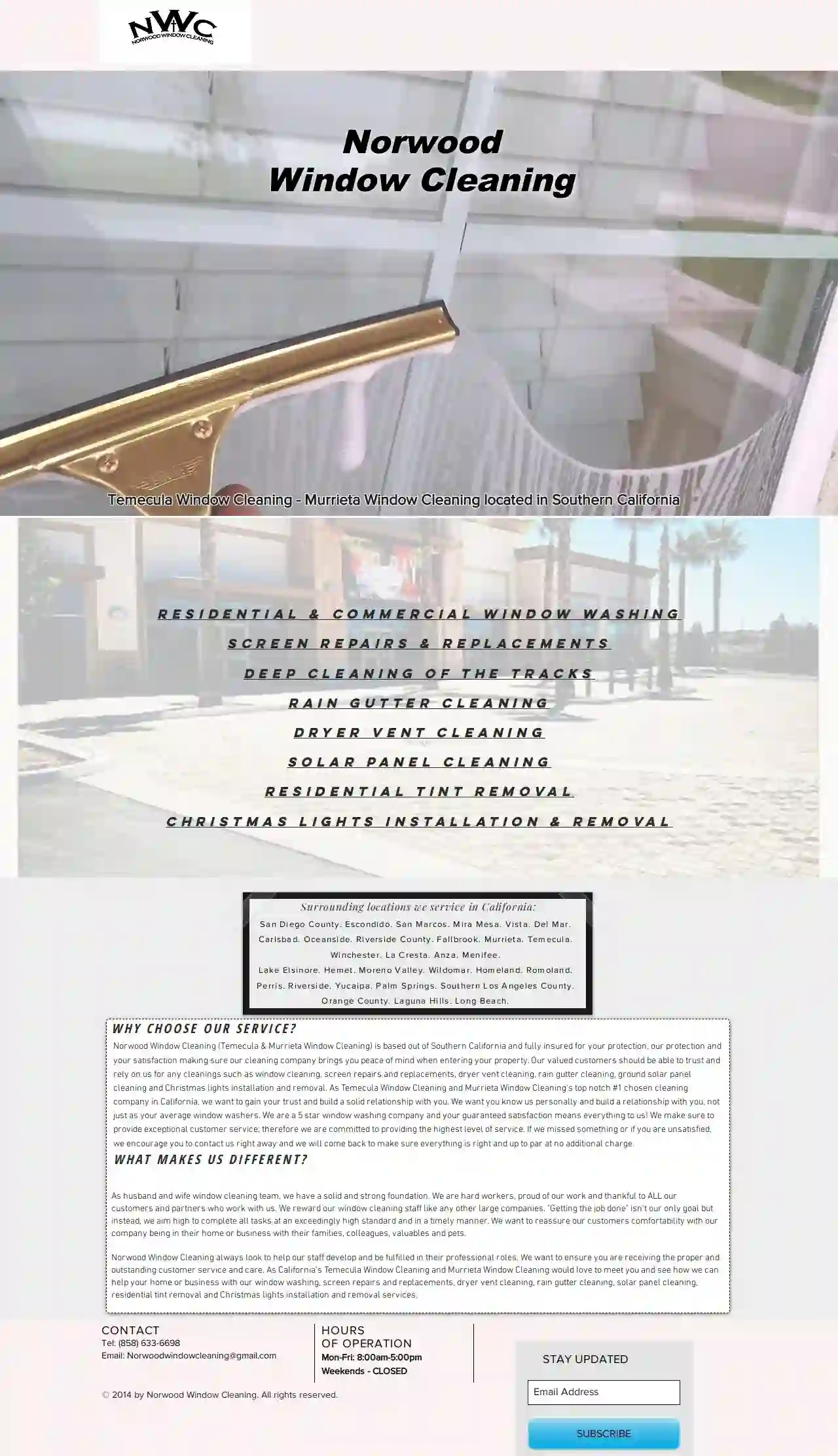Window Cleaning Oroville East
Find the best Window Washing in Oroville East
Receive 3 FREE Commercial Window Cleaning quotes for your project today! Compare profiles, reviews, accreditations, portfolio, etc... and choose the best deal.

Excellent Window Cleaning
4.17 reviewsSan Francisco, USExcellent Window Cleaning is a professional window cleaning service serving commercial and residential properties throughout the Bay Area. We specialize in reaching those high and hard-to-reach windows. Since 1986, we've built a reputation for providing timely, efficient, and detail-oriented service. Our friendly and professional staff is dedicated to exceeding your expectations. We're proud to have a large repeat clientele and over 30 years of experience serving the entire Bay Area. We are fully insured, bonded, and carry worker's compensation. Our prices are competitive and reasonable. Contact us today for a free estimate! We're committed to environmental responsibility and contribute a portion of our profits to environmental organizations. Click here to read our latest article featured in The Good Service Guide.
- Services
- Why Us?
- Gallery
Get Quote
Ahh! Clean Windows!
510 reviewsOrange, USCELEBRATING 25 YEARS! Ahh! Clean Windows! (949) 424-9330 We make it easy for you to get the best service possible without the stress. Check out some of our most popular cleaning packages or customize your own. Full Sunset Clean exterior of all windows Clean interior of all windows Clean all tracks Clean all screens Palm View Clean exterior (view windows only) Clean interior (view windows only) Clean screens (view Windows only) The Wave Clean exterior of all windows Clean all screens (Does NOT include interior) WindowCleaning Deck Glass Glass Railings Solar Panel Cleaning SkylightCleaning ScreenCleaning LanternCleaning Ahh! Clean Windows! has served Laguna Beach and surrounding cities for over 25 years. We are a husband and wife team focused on providing exceptional customer service. We pride ourselves not only in the quality of our service but in our record of reliability. When we say we will be there, we will! In order to make your window cleaning experience stress free here is a brief description of what to expect: We will schedule a free on site, walk-thru, allowing us to provide the most accurate estimate, preventing any surprises on day of service. Then we will send you a PDF estimate via email. Once approved Kimberly will schedule your service. We will send you a text or email reminder at least a day before time of service. Then Jacob and Kimberly will arrive as scheduled to clean your windows. Then you can say “Ahh! Clean Windows” If you would like us to contact you: Please enable JavaScript in your browser to complete this form. Name * First Last Email: Phone Number: * Please contact me via: Text Email Phone Call I need the following services: Exterior & Interior - Window Cleaning Exterior Only - Window Cleaning View Only - Window Cleaning Skylight Cleaning Interior Mirrors Screen Cleaning Deck Glass / Glass Railing Cleaning Solar Panel Cleaning Lantern Cleaning Pressure Washing Comment or Message Submit Get your PERSONALLY TAILORED estimate today! (949) 424-9330 Manage Cookie Consent To provide the best experiences, we use technologies like cookies to store and/or access device information. Consenting to these technologies will allow us to process data such as browsing behavior or unique IDs on this site. Not consenting or withdrawing consent, may adversely affect certain features and functions. Functional Functional Always active The technical storage or access is strictly necessary for the legitimate purpose of enabling the use of a specific service explicitly requested by the subscriber or user, or for the sole purpose of carrying out the transmission of a communication over an electronic communications network. Preferences Preferences The technical storage or access is necessary for the legitimate purpose of storing preferences that are not requested by the subscriber or user. Statistics Statistics The technical storage or access that is used exclusively for statistical purposes. The technical storage or access that is used exclusively for anonymous statistical purposes. Without a subpoena, voluntary compliance on the part of your Internet Service Provider, or additional records from a third party, information stored or retrieved for this purpose alone cannot usually be used to identify you. Marketing Marketing The technical storage or access is required to create user profiles to send advertising, or to track the user on a website or across several websites for similar marketing purposes. Manage options Manage services Manage vendor_count vendors Read more about these purposes Accept Deny View preferences Save preferences View preferences title title title Manage consent
- Services
- Why Us?
- Accreditations
- Our Team
- Gallery
Get Quote
The Maids in Mission Viejo
4.33 reviewsMission Viejo, California, 23881 Via Fabricante Suite #509, 92691, USGet Personalized Cleaning Services Without The Hassle – Exclusive Partner of Mr. Clean. The Maids is a leading home cleaning service that provides top-rated professional cleaning services with a healthy focus. Our team of professionally trained cleaners use eco-friendly products and state-of-the-art equipment to deliver exceptional cleaning results. With a wide range of cleaning services, including one-time, recurring, and deep cleaning, we cater to various needs and budgets. Our mission is to provide personalized cleaning services that fit your lifestyle and budget. We are proud to be an exclusive partner of Mr. Clean, ensuring our cleaning services meet the highest standards.
- Services
- Why Us?
- Testimonials
- Gallery
Get Quote
McCormick's Window Cleaning
5429 reviews1000 N 2nd St, El Cajon, 92020, USMcCormick’s Window Cleaning has been serving residential and commercial clients in El Cajon and throughout San Diego County since 2008. We are a family-owned and operated business dedicated to providing top-notch window cleaning services with a focus on customer satisfaction. Our team is comprised of friendly, honest, and experienced professionals who are committed to delivering exceptional results. We understand that your time is valuable, so we strive to make the window cleaning process as convenient as possible. We arrive on time, wear clean shoe covers and gloves inside your home, and work efficiently to minimize disruption. We take pride in our work and guarantee your satisfaction. Whether you need your windows cleaned for a special occasion, regular maintenance, or simply to enhance the beauty of your home or business, McCormick’s Window Cleaning is here to help.
- Services
- Why Us?
- Gallery
Get Quote
Undisputed Custodial Services
59 reviews3414 E Gettysburg, Fresno, 93726, USUndisputed LLC offers cleaning services for any needs. From carpet shampoo, to complete auto detail, and industrial to home cleaning and everything in between. We deliver quality and reliable cleaning services every time. When you hire our services you can rest assure we sill show up on time and the job will be done. We understand that every client has unique cleaning needs. Feel free to message or call us with any specifics. Your time is valuable, and we will make sure to get back to you as soon as we can.
- Services
- Why Us?
- Gallery
Get Quote
Fish Window Cleaning
561 reviews3658 Ruffin Road Suite A, San Diego, 92123, USOwner: Phil & Rachel Thomas Serving: San Diego, La Mesa, El Cajon, Santee, Clairemont Mesa, and Mission Valley, CA! We're located at: 3658 Ruffin Road Suite A, San Diego CA 92123 (619) 354-1399 Welcome to Fish Window Cleaning San Diego! We are your local commercial and residential window cleaning company serving San Diego, La Mesa, El Cajon, Santee, Clairemont Mesa, and Mission Valley, CA! Our estimates are always free so give us a call today! (619) 354-1399 Our Services: Interior & Exterior Window Cleaning Window Screen Cleaning Window Sill Cleaning Awning Cleaning Chandelier Cleaning Skylight Cleaning Mirror Cleaning Ceiling Fan Cleaning Outdoor Light Fixture Cleaning We are your locally owned and operated window cleaning company and we are ready to serve you. Our team is always professional, courteous, and respectful of your home or business. We are bonded and insured and committed to your satisfaction. Your Home Wouldn't it be great to never have to spend a whole Saturday cleaning windows ever again? We can make that dream a reality with our wide range of cleaning services! Our window cleaners can clean all of your windows - inside and out - quickly so you can enjoy your free time. You won't have anything to worry about when you have Fish Window Cleaning in your home because we use cloth pads to protect your floors, we are careful moving around your possessions, and most importantly - we are honest and trustworthy! We will even make sure you are completely satisfied before we leave your home. Click here for more information about our residential services. "We asked for a quote online and were immediately contacted. Phil came out the next day and after explaining their window cleaning process gave us a very reasonable quote. They were out the next morning as promised and did a great job. We would definitely recommend Phil and Fish window cleaning." Your Business If you're looking for a way to enhance the appearance of your business, look no further! We can change the whole look and feel of your business just by removing all of the streaks, smudges, and fingerprints from your windows and glass doors. We even wipe down your frames or sills and remove cobwebs. We know you have more important tasks than cleaning your windows so let us take one more thing off your list of responsibilities! We are very flexible and customize our programs to meet your needs, budget, and schedule. No job is too big or too small for us! Click here for more information about our commercial services. "FISH is the best window cleaning company! In a large preschool full of many hand prints, having a great window cleaner is a must. Phil and his team are professional, reliable, and reasonably priced. As soon
- Services
- Why Us?
- Our Team
- Testimonials
- Gallery
Get Quote- Ba
Barajas House Cleaning Services
11 reviewsSan Jose, USMeta © 2024
- Services
- Why Us?
- Gallery
Get Quote 
Lindas Maids residential &commercial cleaning
3.38 reviewsN/A, US- Services
- Why Us?
- Accreditations
- Our Team
- Testimonials
- Gallery
Get Quote
Squeegee Pro Costa Mesa Window Cleaners
4.936 reviews3001 Red Hill Ave, Costa Mesa, 92626, USFor over 21 years Squeegee Pro has been serving Orange County. We are a family owned and locally operated company where we care about our customers, contractors, and love providing great service to our clients. We can usually give you a quote right over the phone, and all our service technicians are real employees covered by worker's compensation. Thanks to all our great customers! For over 21 years we’ve been providing the best quality window cleaning, and pressure washing to the Southern California area. We appreciate the opportunity to earn your business, and hope to have you as a customer for another 21 years to come. We donate a portion of each invoice to Kidsave a local charity that gives often forgotten older kids living in orphanages and foster homes loving parents and mentors.Elizabeth, Paul and The Squeegee Pro Team
- Services
- Why Us?
- Gallery
Get Quote
Norwood Window Cleaning
4.840 reviewsMurrieta, USNorwood Window Cleaning (Temecula & Murrieta Window Cleaning) is based out of Southern California and fully insured for your protection, our protection and your satisfaction making sure our cleaning company brings you peace of mind when entering your property. Our valued customers should be able to trust and rely on us for any cleanings such as window cleaning, screen repairs and replacements, dryer vent cleaning, rain gutter cleaning, ground solar panel cleaning and Christmas lights installation and removal. As Temecula Window Cleaning and Murrieta Window Cleaning's top notch #1 chosen cleaning company in California, we want to gain your trust and build a solid relationship with you. We want you know us personally and build a relationship with you, not just as your average window washers. We are a 5 star window washing company and your guaranteed satisfaction means everything to us! We make sure to provide exceptional customer service; therefore we are committed to providing the highest level of service. If we missed something or if you are unsatisfied, we encourage you to contact us right away and we will come back to make sure everything is right and up to par at no additional charge. As husband and wife window cleaning team, we have a solid and strong foundation. We are hard workers, proud of our work and thankful to ALL our customers and partners who work with us. We reward our window cleaning staff like any other large companies. "Getting the job done" isn't our only goal but instead, we aim high to complete all tasks at an exceedingly high standard and in a timely manner. We want to reassure our customers comfortability with our company being in their home or business with their families, colleagues, valuables and pets. Norwood Window Cleaning always look to help our staff develop and be fulfilled in their professional roles. We want to ensure you are receiving the proper and outstanding customer service and care. As California's Temecula Window Cleaning and Murrieta Window Cleaning would love to meet you and see how we can help your home or business with our window washing, screen repairs and replacements, dryer vent cleaning, rain gutter cleaning, solar panel cleaning, residential tint removal and Christmas lights installation and removal services.
- Services
- Why Us?
- Gallery
Get Quote
Over 60,241+ Janitorial Companies onboarded
Our cleaning contractors operate in Oroville East and surrounding areas!
CleaningMatch has curated and vetted Top Janitorial Services in Oroville East. Find a top & trustworthy pro today.
Frequently Asked Questions About Window Cleaning
- Training and Certification: Professional high-rise window cleaners undergo specialized training and certification programs to learn safe working practices and rescue procedures.
- Safety Equipment: They use harnesses, ropes, and other safety equipment to secure themselves to the building while cleaning.
- Risk Assessments: Before starting a job, companies conduct thorough risk assessments to identify potential hazards and implement appropriate safety measures.
- Weather Monitoring: High-rise window cleaning is typically avoided during strong winds or adverse weather conditions to minimize risks.
- Ask Directly: When requesting quotes or contacting the company, ask directly if they have liability insurance and workers' compensation insurance.
- Check Their Website: Many reputable window cleaning companies will prominently display their insurance information on their website.
- Request Proof of Insurance: Don't hesitate to request a copy of their insurance certificate for verification. This document outlines their coverage and policy details.
- Superior Results: Professional window cleaners have the experience, techniques, and tools to achieve a streak-free, spotless finish that is difficult to replicate with DIY methods.
- Time-Saving: Cleaning windows can be time-consuming, especially for larger homes or businesses. Hiring professionals frees up your time for other tasks.
- Safety: Professional window cleaners are trained in safety procedures, especially for high windows, minimizing the risk of accidents.
- Specialized Equipment: Professionals have access to specialized equipment, such as water-fed pole systems, that can reach high windows and clean more efficiently.
- Extended Window Lifespan: Regular professional cleaning removes dirt, grime, and mineral deposits that can damage glass over time, extending the lifespan of your windows.
- Number of Windows: The more windows you have, the higher the cost will generally be.
- Size and Type of Windows: Large windows, multi-paned windows, or windows with special features (e.g., skylights) may cost more to clean.
- Accessibility: Windows that are difficult to reach (e.g., high-rise windows) will require specialized equipment and may cost more.
- Interior vs. Exterior: Cleaning both interior and exterior windows will cost more than cleaning just one side.
- Frequency: Regular cleaning schedules often come with discounted rates compared to one-time cleanings.
Is it safe for window cleaners to clean high-rise windows?
Reputable window cleaning companies adhere to strict safety regulations and invest in training and equipment to ensure the well-being of their employees and the public.
How can I tell if a window cleaning company is insured?
A reputable and responsible window cleaning company will be transparent about their insurance coverage, providing peace of mind for their clients.
What are the benefits of having professionally cleaned windows?
If you value sparkling clean windows, time savings, safety, and professional expertise, hiring a window cleaning service is a worthwhile investment.
How much does professional window cleaning cost?
To get accurate pricing, request quotes from multiple window cleaning companies. Be sure to provide detailed information about your windows and cleaning requirements.
Is it safe for window cleaners to clean high-rise windows?
- Training and Certification: Professional high-rise window cleaners undergo specialized training and certification programs to learn safe working practices and rescue procedures.
- Safety Equipment: They use harnesses, ropes, and other safety equipment to secure themselves to the building while cleaning.
- Risk Assessments: Before starting a job, companies conduct thorough risk assessments to identify potential hazards and implement appropriate safety measures.
- Weather Monitoring: High-rise window cleaning is typically avoided during strong winds or adverse weather conditions to minimize risks.
Reputable window cleaning companies adhere to strict safety regulations and invest in training and equipment to ensure the well-being of their employees and the public.
How can I tell if a window cleaning company is insured?
- Ask Directly: When requesting quotes or contacting the company, ask directly if they have liability insurance and workers' compensation insurance.
- Check Their Website: Many reputable window cleaning companies will prominently display their insurance information on their website.
- Request Proof of Insurance: Don't hesitate to request a copy of their insurance certificate for verification. This document outlines their coverage and policy details.
A reputable and responsible window cleaning company will be transparent about their insurance coverage, providing peace of mind for their clients.
What are the benefits of having professionally cleaned windows?
- Superior Results: Professional window cleaners have the experience, techniques, and tools to achieve a streak-free, spotless finish that is difficult to replicate with DIY methods.
- Time-Saving: Cleaning windows can be time-consuming, especially for larger homes or businesses. Hiring professionals frees up your time for other tasks.
- Safety: Professional window cleaners are trained in safety procedures, especially for high windows, minimizing the risk of accidents.
- Specialized Equipment: Professionals have access to specialized equipment, such as water-fed pole systems, that can reach high windows and clean more efficiently.
- Extended Window Lifespan: Regular professional cleaning removes dirt, grime, and mineral deposits that can damage glass over time, extending the lifespan of your windows.
If you value sparkling clean windows, time savings, safety, and professional expertise, hiring a window cleaning service is a worthwhile investment.
How much does professional window cleaning cost?
- Number of Windows: The more windows you have, the higher the cost will generally be.
- Size and Type of Windows: Large windows, multi-paned windows, or windows with special features (e.g., skylights) may cost more to clean.
- Accessibility: Windows that are difficult to reach (e.g., high-rise windows) will require specialized equipment and may cost more.
- Interior vs. Exterior: Cleaning both interior and exterior windows will cost more than cleaning just one side.
- Frequency: Regular cleaning schedules often come with discounted rates compared to one-time cleanings.
To get accurate pricing, request quotes from multiple window cleaning companies. Be sure to provide detailed information about your windows and cleaning requirements.